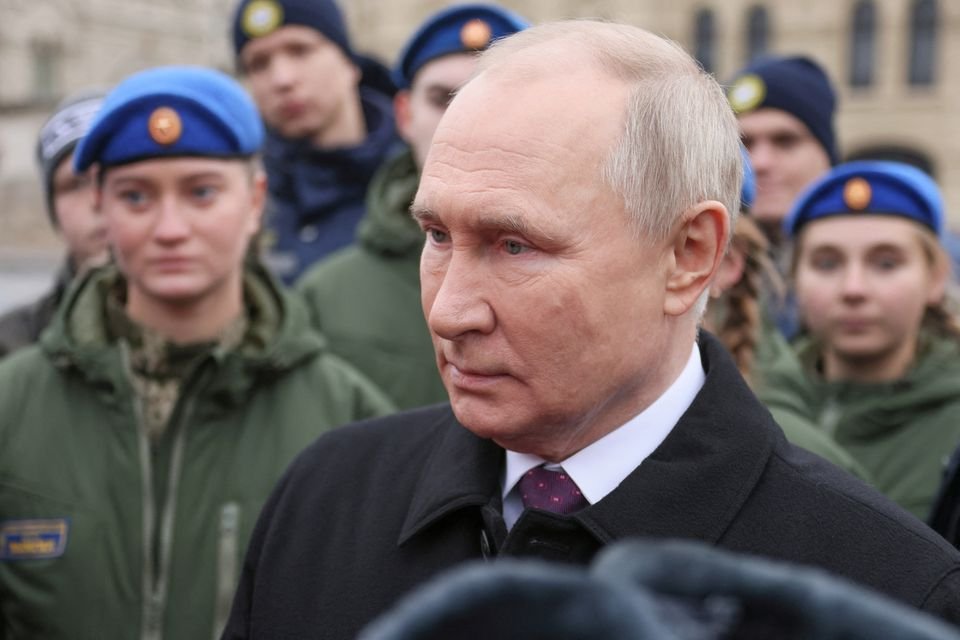Russia’s Putin will stay in power past 2024, sources say. According to six individuals who spoke to Reuters, Vladimir Putin has chosen to compete in the March presidential election, securing his position as president until at least 2030. The Kremlin boss believes he must lead Russia through its most dangerous time in decades.
Since Boris Yeltsin gave him the presidency on the final day of 1999, Putin has presided over Russia longer than any other leader since Josef Stalin—even surpassing the eighteen-year term of Leonid Brezhnev.
On October 7, Putin celebrated his 71st birthday. Because of the delicate nature of Kremlin politics, the sources, who spoke to Reuters anonymously, said that word had spread about Putin’s choice and that advisors were now getting ready for the campaign and a Putin election.
Putin, whose approval ratings in Russia are estimated to be 80%, sees the election as a formality if he runs since he would undoubtedly win with the backing of the government, the state media, and the vast majority of the populace.
“He is going to run; the decision has already been made,” one of the insiders with planning experience stated, according to a second insider, who confirmed a Kommersant daily article last month; a staged indication is expected to appear in the coming weeks.
It was verified by a second source familiar with the Kremlin’s thinking that a decision had been taken and that Putin’s advisors were getting ready for Putin’s involvement. According to three additional sources, Putin has already decided to run.
One of the informants declared, “The world we look out upon is perilous.” Putin made the choice lately, according to a foreign diplomatic source who also asked to remain anonymous, and the announcement will be made shortly.
Although several foreign diplomats, spies, and officials have stated that they believe Putin will hold onto power indefinitely, there has been no formal confirmation of his intention to contest in the March 2024 presidential election.
Dmitry Peskov, the Kremlin’s spokesperson, declined to comment. Peskov stated in September that no one could challenge Putin should he choose to run. The Kremlin has discounted reports that Putin was ill as lies propagated by the West.
RUSSIAN ATTACKS
Putin, the former KGB agent, may not have much opposition in the election. Still, he is up against the most formidable combination of obstacles that any leader of the Kremlin has encountered since Mikhail Gorbachev struggled to stabilize the collapsing Soviet Union over thirty years ago.
Russia’s most potent mercenary, Yevgeny Prigozhin, attempted to overthrow Putin in June, and the war in Ukraine has set off the most significant confrontation between the two countries with the West since the 1962 Cuban Missile Crisis. Additionally, sanctions imposed by the West have caused the most critical external shock to the Russian economy in decades.
An aircraft disaster claimed Prigozhin’s life two months to the day after the rebellion.
The West sees Putin as a war criminal and a despot who has driven Russia into an imperialistic territorial grab that has strengthened Ukraine’s independence and united the West while giving NATO a mission.
Putin, however, frames the conflict as a part of a more significant conflict between Russia and the United States that, according to the Kremlin elite, is intended to split Russia apart, seize its abundant natural resources, and then move to settle scores with China.
One of the insiders stated, “Major change would not be expedient because Russia is facing the combined might of the West.”
Russia is producing a record number of weapons. Russia expects its $2.1 trillion economy to expand more than the EU this year. Russia’s economy depends heavily on the price of Ural crude oil, which averaged $81.52 a barrel in October.
GRINDING SCREWS
However, for some Russians, the war has exposed the flaws of post-Soviet Russia. Arrested According to opposition lawmaker Alexei Navalny, Putin has led Russia into a disastrous strategic dead end, creating a fragile network of dishonest sycophants that will eventually bring about turmoil rather than stability.
Oleg Orlov, one of Russia’s most renowned human rights advocates, told Reuters in July that “Russia is going backwards.” “We left Communist totalitarianism but now have returned to a different kind of totalitarianism.”
In less than a year and a half of fighting, several hundred thousand Russian and Ukrainian soldiers are thought to have lost their lives or been injured—far more than the Soviet Union officially reported losing throughout the whole 1979–1989 conflict in Afghanistan.
Before his rebellion, Prigozhin chastised Putin’s generals for the war and what he saw as their inept handling of it, threatening revolution in Russia if the ruling class did not change course. Prigozhin declared a month before his mutiny that “this divide can end as in 1917 with a revolution”.










































Comment Template